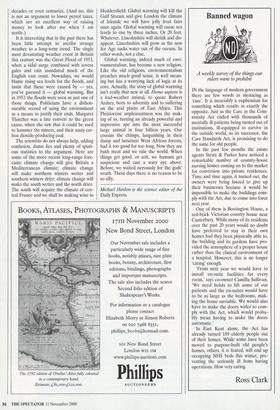Banned wagon
A weekly survey of the things our rulers want to prohibit
IN the language of modern government there are few words as menacing as `care'. It is invariably a euphemism for something which results in exactly the opposite. Just as the Care in the Com- munity Act ended with thousands of mentally ill patients being turned out of institutions, ill-equipped to survive in the outside world, so its successor, the Care Standards Act, is promising to do the same for old people.
In the past few months the estate agents Strutt & Parker have noticed a remarkable number of country-house nursing homes coming on to the market for conversion into private residences. Time and time again, it turned out, the owners were being forced to give up their businesses because it would be impossible to make the buildings com- ply with the Act, due to come into force next year.
One of them is Bossington House, a red-brick Victorian country house near Canterbury. While many of its residents over the past 20 years would no doubt have preferred to stay in their own homes had they been physically able to, the building and its gardens have pro- vided the atmosphere of a proper house rather than the clinical environment of a hospital. However, this is no longer `caring' enough.
`From next year we would have to install en-suite facilities for every room,' says co-owner Camilla Sullivan. `We need hoists to lift some of our patients and the en-suites would have to be as large as the bedrooms, mak- ing the home unviable. We would also have to make the doors wider to com- ply with the Act, which would proba- bly mean having to make the doors automatic.'
In East Kent alone, the Act has already turned 189 elderly people out of their homes. While some have been moved to purpose-built old people's homes, others, it is feared, will end up occupying NHS beds this winter, pre- venting the seriously ill from having operations. How very caring.
Ross Clark


























































































 Previous page
Previous page